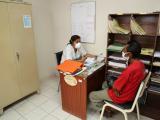Mar 6, 2009
HHS seeks proposals for smallpox antiviral
The US Department of Health and Human Services (HHS) issued a request for proposals (RFP) on its Web site yesterday seeking 1.7 million treatment courses of a smallpox antiviral for the Strategic National Stockpile. The 5-year contract, offered through the Biomedical Advanced Research and Development Authority (BARDA), would cover advanced development of the countermeasure. The contract requires that the smallpox antiviral for adults ages 18 to 64 require no more than 3 doses per day for up to 21 days and have a minimum shelf-life of 36 months. The contract includes options for intravenous and liquid formulations and the capacity to scale up production to make 12 million more courses.
[Mar 5 HHS smallpox antiviral RFP]
Bank drill to test countermeasure distribution
In one of the first exercises of its kind, banks in two Utah towns will test the logistics of handing out antibiotics or antiviral medications at bank drive-through windows to prepare for an influenza pandemic or bioterrorist attack. The Summit County Health Department is planning the drill, which will take place tomorrow at two Zions Bank branches in Coalville and Kamas, both located about 40 miles east of Salt Lake City. The exercise is funded by a grant from the Centers for Disease Control and Prevention Cities Readiness Initiative, the Salt Lake Tribune reported yesterday.
Private inspector missed problems at Georgia peanut plant
A private food safety inspector gave the Peanut Corp. of America's (PCA's) Georgia processing plant a "superior" rating after auditing it a year ago, though federal inspectors later found the plant had already been shipping Salmonella-tainted products for months before that, the New York Times reported yesterday. With government inspectors overburdened, many food companies pay for private food-safety inspections, which vary widely in their rigor, the report said. The man who inspected the Georgia plant was not aware that peanuts could harbor Salmonella, the story said.
[Mar 5 New York Times report]
Texas inspector failed to report unlicensed plant tied to outbreak
A Texas agriculture inspector who visited the PCA peanut plant in Plainview, Tex., three times in recent years failed to note that it was operating without a state health department license, according to an Associated Press (AP) report today. The inspector, who was assigned to certify the plant to process organic products, wrongly indicated that the plant was licensed, which allowed it to escape state health inspectors' notice, the story said. The facility came under investigation as a result of the current nationwide Salmonella outbreak linked to PCA products. Though the outbreak has been blamed mainly on the PCA plant in Georgia, the outbreak strain was found in samples from the Texas facility in February.
[Mar 6 AP report]
China passes new food safety law
In response to several tainted food incidents, China on Feb 28 passed a new law that strengthens food safety regulation and boosts penalties for offenders, the Voice of America reported on Mar 2.The new law provides extra compensation for victims of tainted food, bans supervisory agencies from advertising food products, and makes people, such as celebrities, who advertise for tainted products liable for damages. Also, China's departments of health, agriculture, quality supervision, industry, and commerce will share responsibility for monitoring the country's food supply.
MRSA and other bugs on healthcare workers' cell phones
Mobile phones are a source of nosocomial pathogens, and regularly cleaning the devices could reduce the number of infections in healthcare institutions, according to Turkish researchers who presented their findings today in the Annals of Clinical Microbiology and Antimicrobials. They took samples from the phones of 200 healthcare workers, along with samples from the workers' hands, and found that 94.5% of the phones were contaminated with bacteria. Staphylococcus aureus strains were isolated from 52% of the phones, of which 37.7% were methicillin-resistant S aureus (MRSA). Gram-negative strains were isolated from 31.3% of phones, of which 39.5% were ceftazidime resistant. Only 10.5% of healthcare workers said they routinely cleaned their cell phones.
[Mar 6 Ann Clin Microbiol Antimicrob study]
Malaria drug looks promising for treating Hendra and Nipah virus infections
A drug commonly used to prevent and treat malaria looks like a potential tool for blocking infections with Hendra and Nipah viruses, which cause encephalitis in humans, researchers reported in a Mar 4 early online edition of the Journal of Virology. The group, using a nonlethal engineered virus that contained Hendra proteins on its surface, found that chloroquine inhibited the action of a key enzyme, cathepsin L, that is essential for the growth of the two viruses. Researchers noted that chloroquine is inexpensive and has been widely and safely used for more than 50 years.
[Mar 4 Journal of Virology abstract]
Defunct infection-fighting gene revived after millions of years
A gene that helps mammals fight infections like tuberculosis and salmonellosis died out very early in primate evolution but was resurrected eons later in the common ancestor of humans and great apes, according to scientists from the University of Washington and the Howard Hughes Medical institute. The gene, called human IRGM, died in the common ancestor of Old World and New World monkey species, but its remnant persisted through millions of years. The gene somehow became functional again in the ancestor of humans and great apes, possibly when a retrovirus inserted itself into the genome, the scientists report in PLoS Genetics.
[Mar 5 University of Washington news release]
[PLoS Genetics article]


















